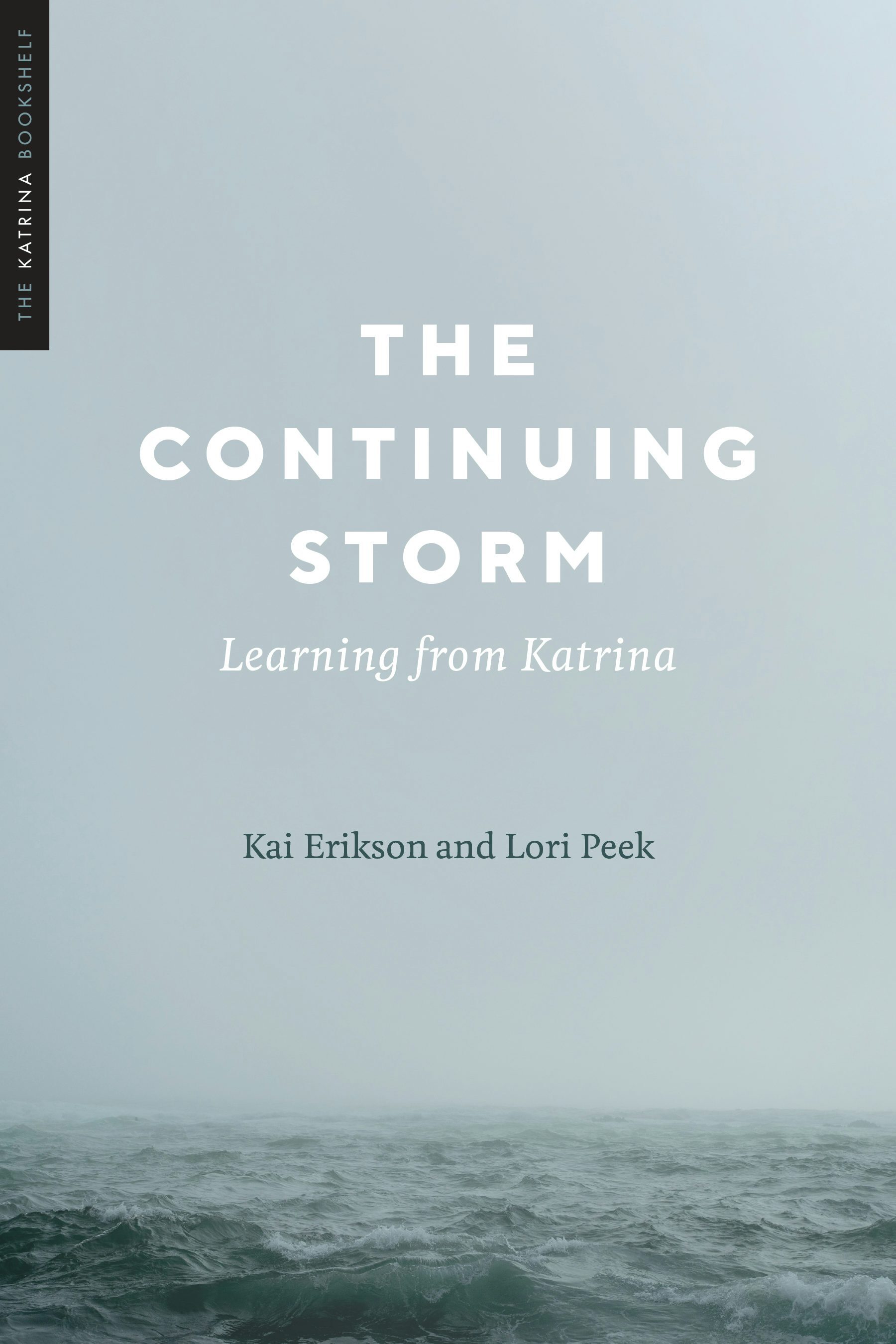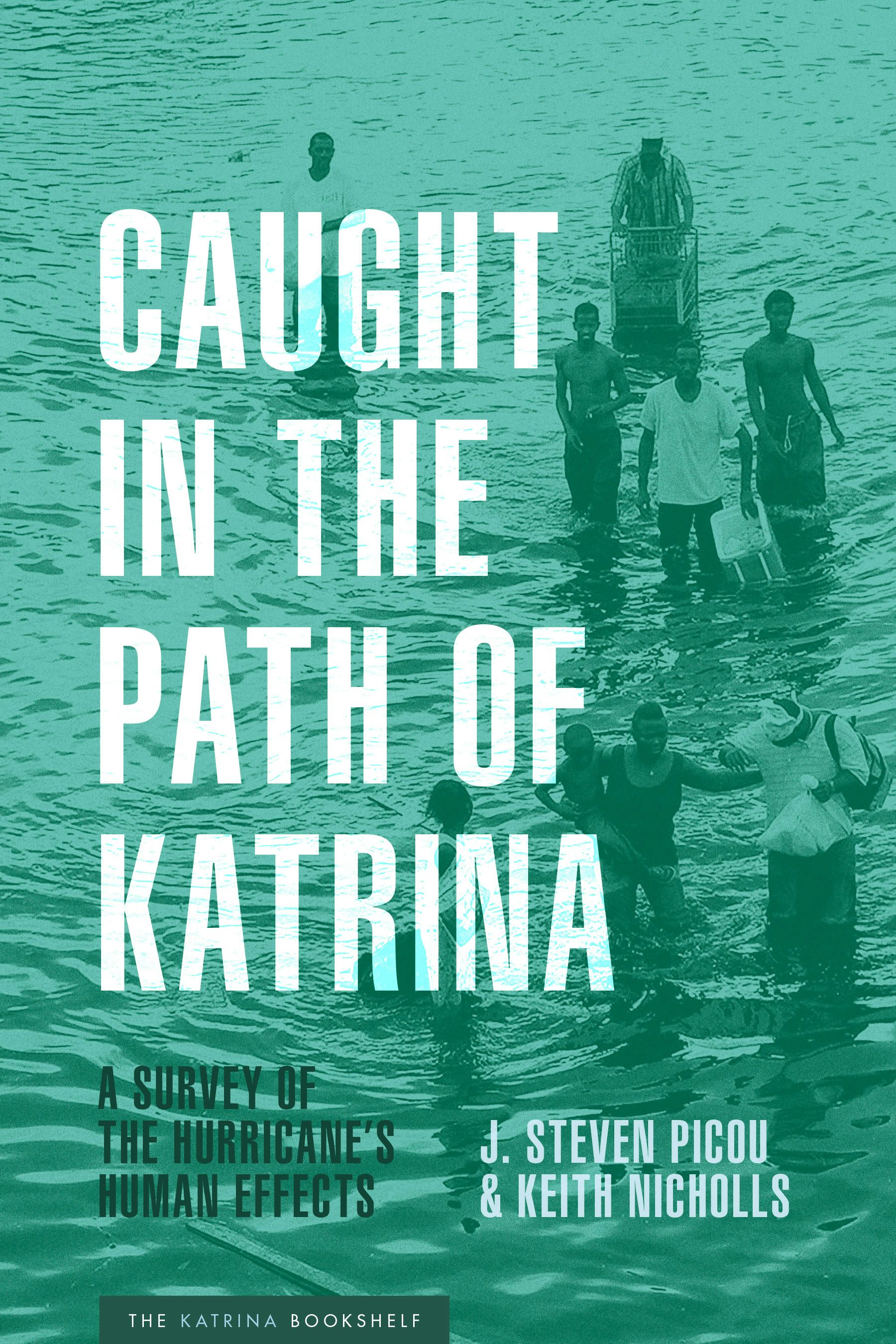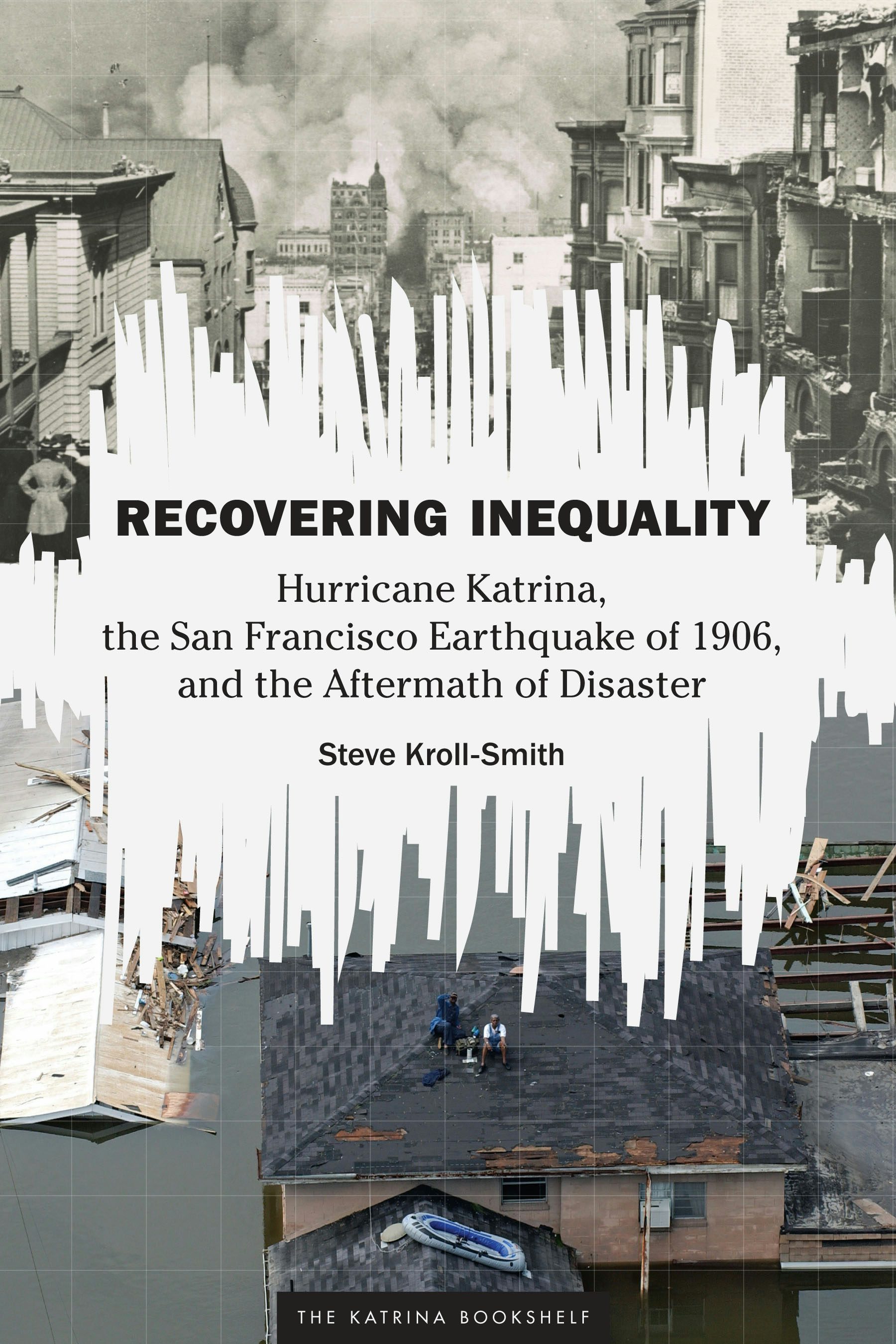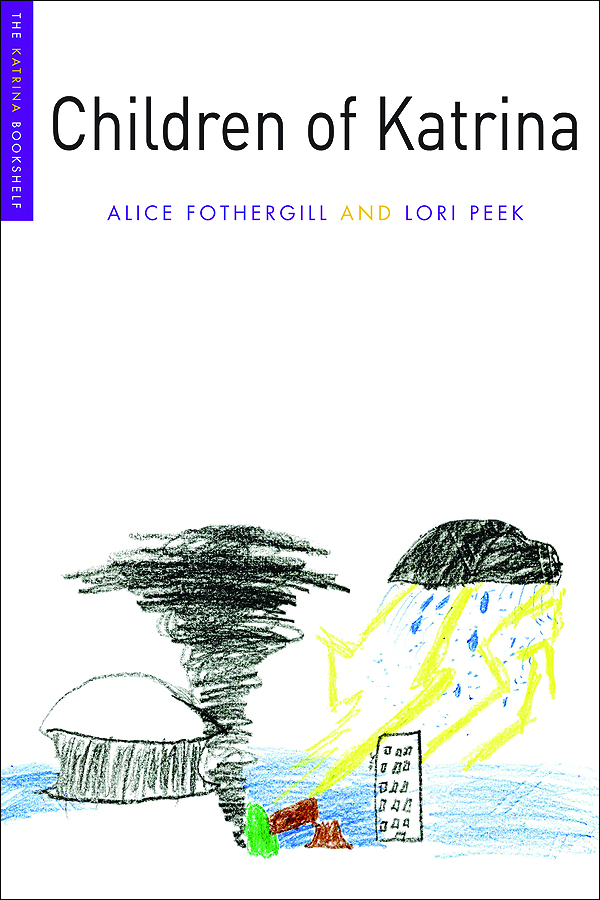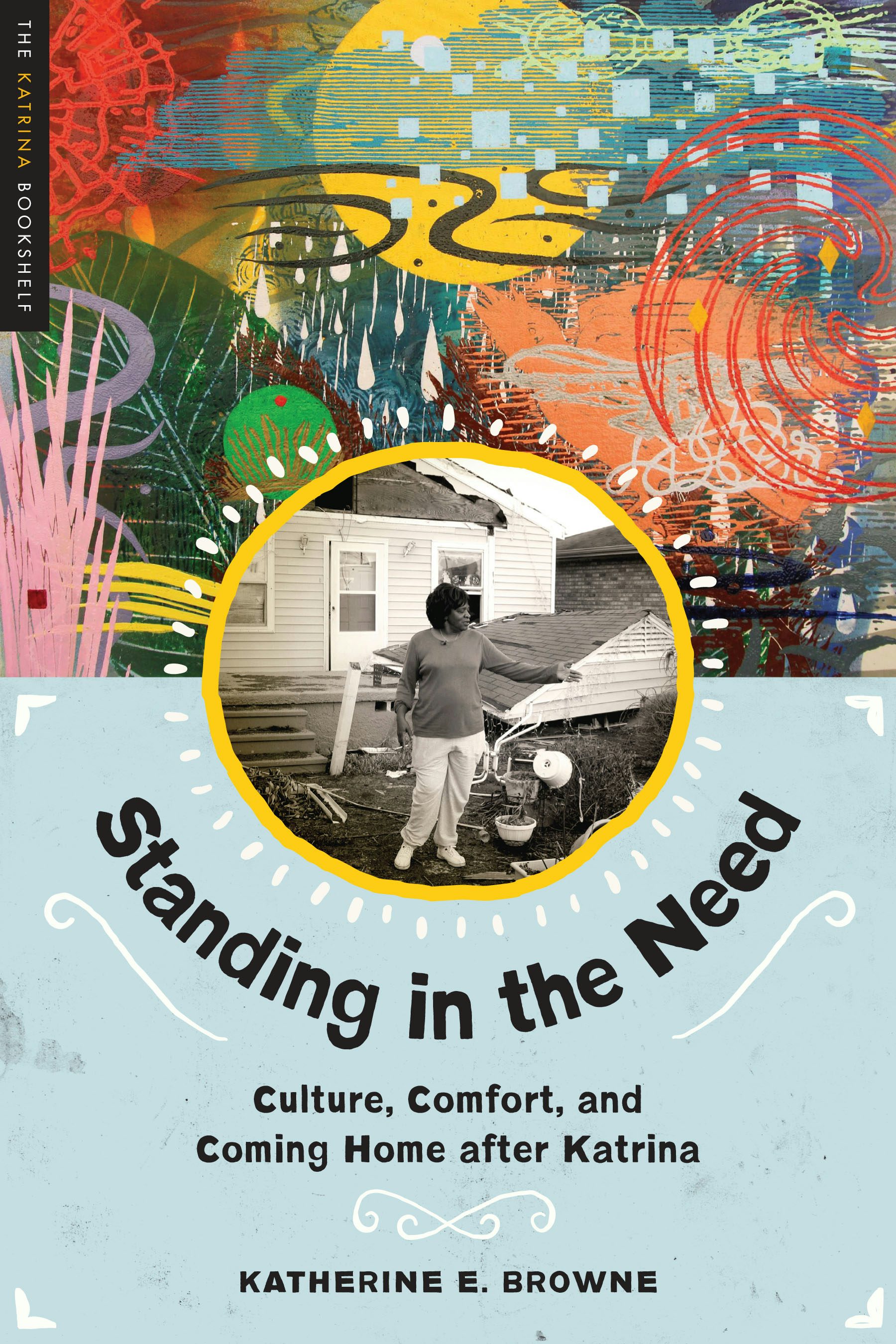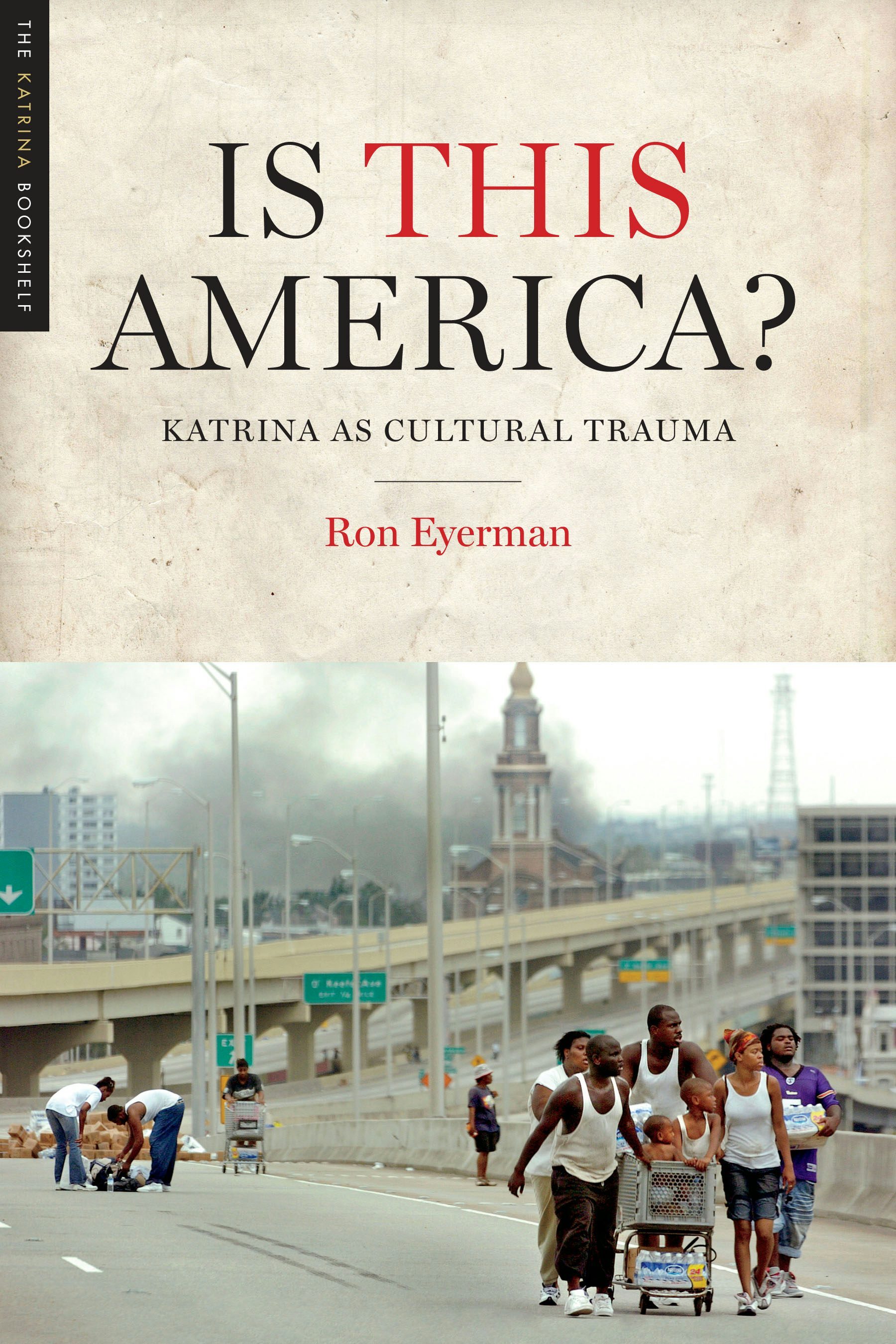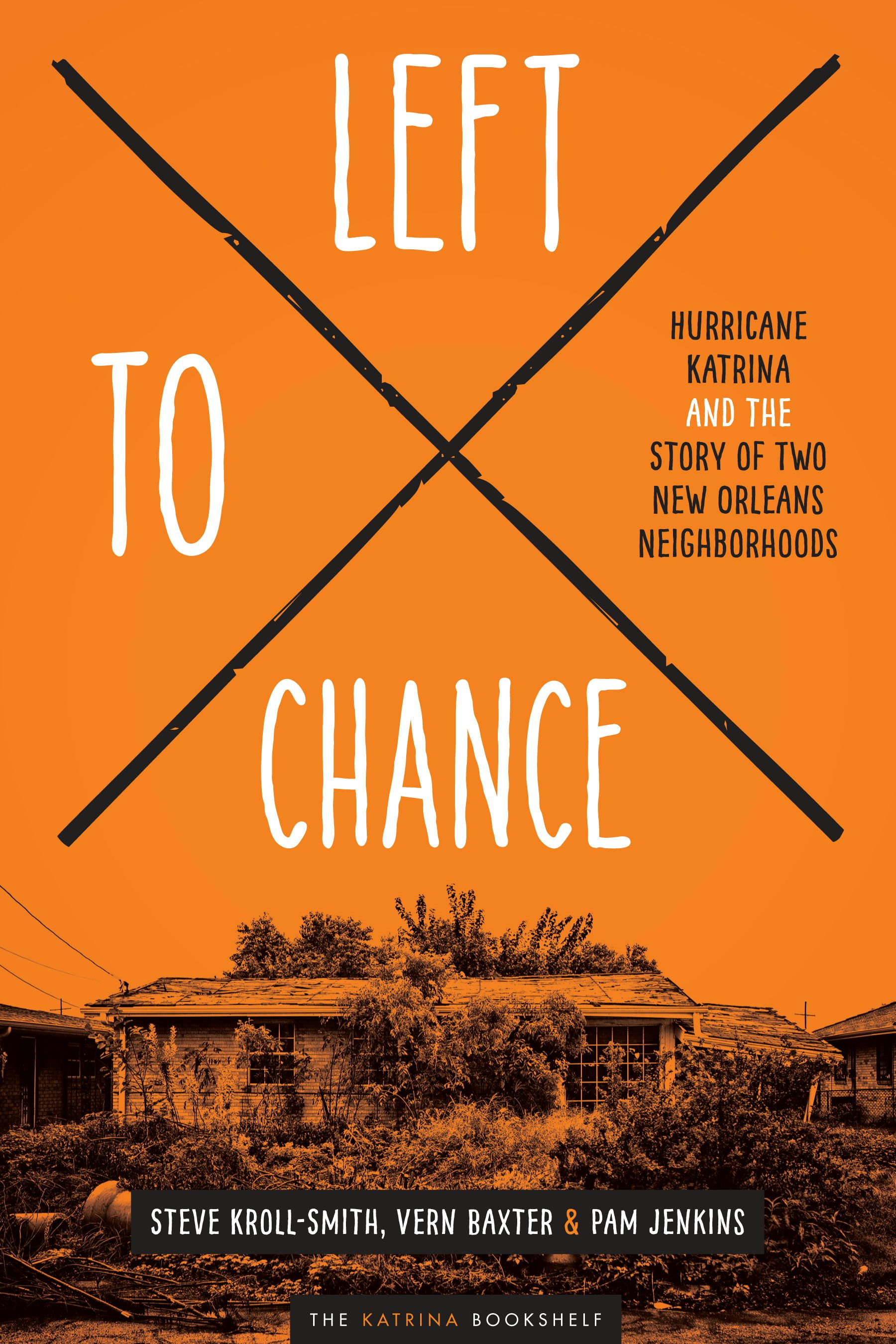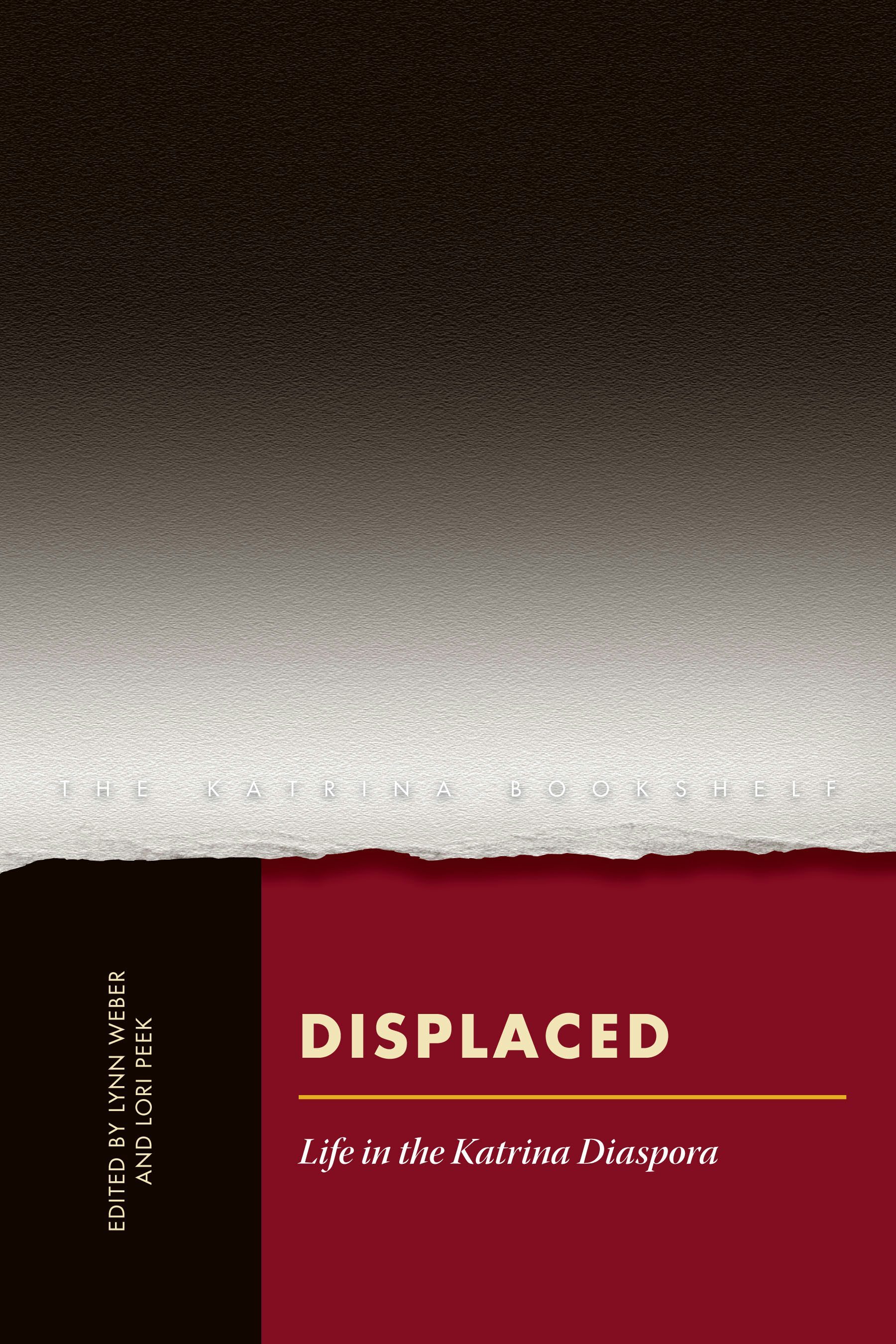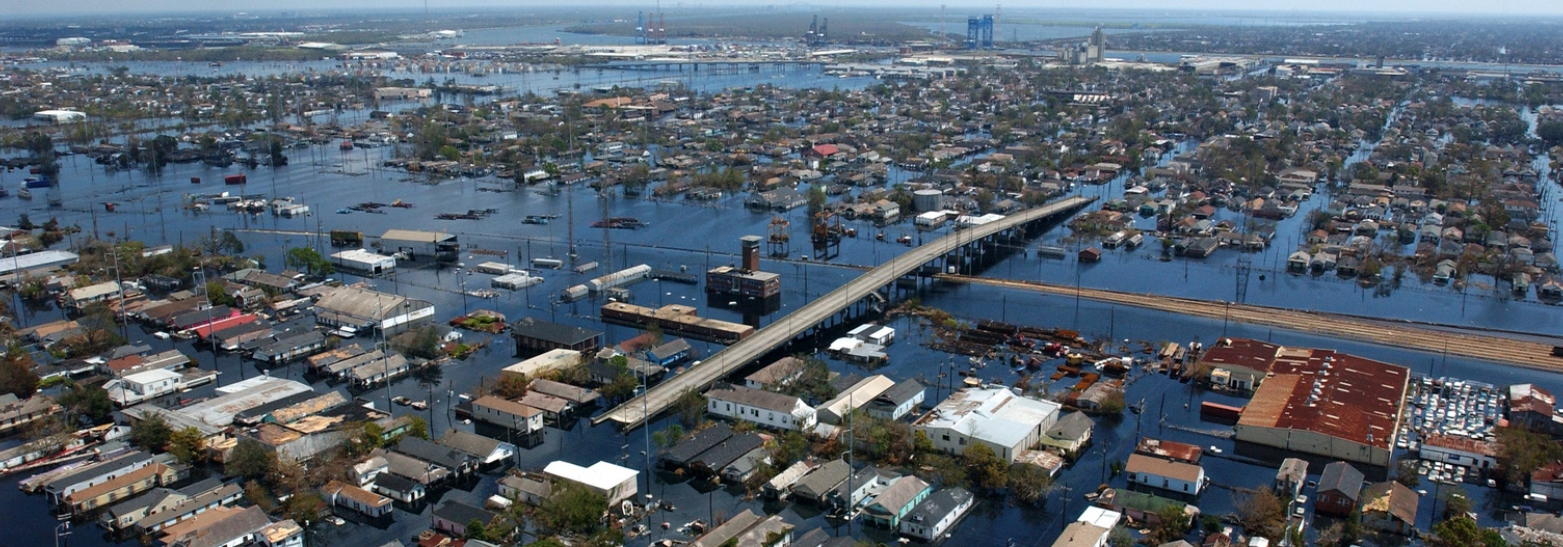
Flooding in New Orleans, Louisiana after Hurricane Katrina's landfall and the levee system failure.
Source: Jocelyn Augustino/FEMA.
Two decades after Hurricane Katrina battered New Orleans and other communities across the Gulf Coast, the storm still looms large in our national memory. The disaster and the long recovery that followed influenced a generation of researchers, historians, journalists, and artists.
The podcasts, films, books, and journal articles curated here represent just a small selection of media and scholarship on Hurricane Katrina. Browse below for a wide variety of personal stories and detailed analyses of Katrina's legacy in science, politics, and emergency management.
Podcasts and Radio Stories
These radio stories capture the stories of Hurricane Katrina survivors in their own voices, and engage experts across all disciplines in interviews about disaster prepardedness and the long road to recovery in New Orleans and other Gulf communities.
Born After the Storm, WWNO
An audio storytelling project from Be Loud Studios and WWNO and WRKF that brings youth, who were not born during Hurricane Katrina, into the citywide conversation about the legacy of the storm.
"Katrina and the River," Big Picture Science
This episode marking the 20th anniversary of Hurricane Katrina, considers how efforts to control the Mighty Mississippi—a river engineered from its Minnesota headwaters to its Gulf Coast outlet—have responded to the devastating storm, and how New Orleans’ relationship to the river has changed.
Floodlines, The Atlantic
Some call it Hurricane Katrina. Some call it the Federal Flood. Others call it the day the levees broke. On August 29, 2005, the city of New Orleans was submerged. That story of hubris, incompetence, and nature's wrath is now etched into the national consciousness. But the people who lived through the flood and its aftermath have a different story to tell. A story of rumors, betrayal, and one of the most misunderstood events in American history.
Additional Podcasts and Radio Stories
"Reflecting on Hurricane Katrina’s Legacy," Delta Dispatches
This episode to commemorate the 15th anniversary of Hurricane Katrina features guests who reflect on the progress since 2005 and the challenges communities still face in building a more equitable Louisiana for all communities.
Katrina: The Debris, WWNO
This series launched by New Orleans Public Radio on the 10th anniversary of Hurricane Katrina features stories about what was left behind by the storm and the floods that followed, exploring themes like groceries, maps, music, weather, charity, faith, cooking, and family.
Routes to Recovery, American Public Media
To mark the second anniversary of Hurricane Katrina, American RadioWorks teams up with Nick Spitzer of American Routes to find out how culture might save New Orleans.
Rebuilding Biloxi, American Public Media
American RadioWorks presents an intimate portrait of several families struggling to rebuild their lives in Biloxi, Mississippi and a city trying to reclaim itself a year after Hurricane Katrina.
Documentaries
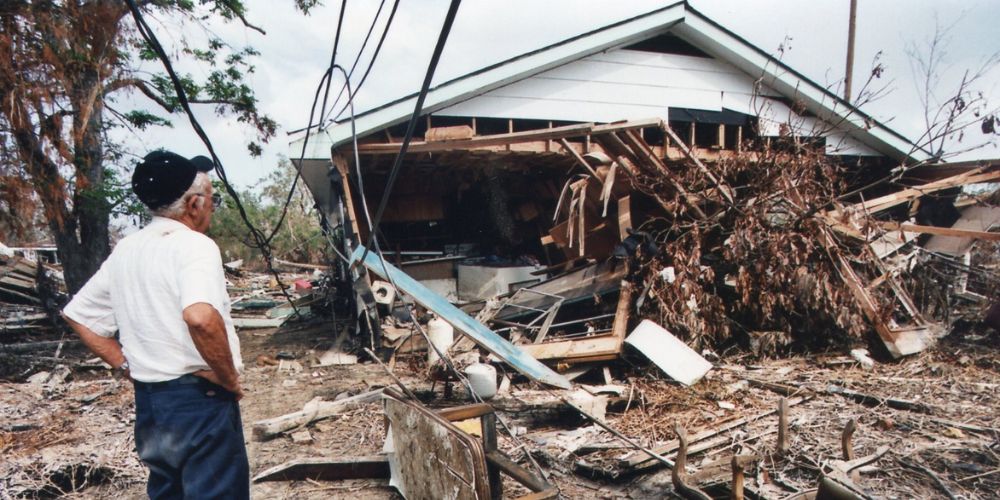 A man surveys damage from Hurricane Katrina at his home in Plaquemines Parish, Louisiana. Source: Louisiana Sea Grant.
A man surveys damage from Hurricane Katrina at his home in Plaquemines Parish, Louisiana. Source: Louisiana Sea Grant.
These films weave together home videos, archival news footage, and in-depth interviews to document the devastation wrought by Hurricane Katrina. They uplift survivor stories and call attention to injustice and failures government which intensified suffering in the aftermath of the storm.
Hurricane Katrina: Race Against Time
A gripping historical record of Hurricane Katrina and its aftermath.
Katrina Babies
An intimate look at the aftermath of Hurricane Katrina and its impact on the youth of New Orleans.
Katrina: Come Hell and High Water
The revisit of the hurricane that caused 1,392 fatalities and more than $100 billion in damages in 2005.
Additional Documentaries
If God Is Willing and da Creek Don't Rise
A follow-up to Spike Lee's acclaimed documentary When the Levees Broke, this documentary returns five years post-Katrina to see how the ambitious plans to reinvent the Crescent City were playing out.
The Old Man and the Storm
A personal account of 82-year-old Herbert Gettridge working alone to repair his home in the lower Ninth Ward, a neighborhood devastated when the levees broke in August 2005.
Law & Disorder
An investigation into shootings by the New Orleans Police Department in the wake of Katrina.
Trouble the Water
A redemptive tale of an aspiring rap artist surviving failed levees and her own troubled past and seizing a chance for a new beginning.
When the Levees Broke: A Requiem in Four Acts
An examination of the U.S. government's response to Hurricane Katrina.
Refuge of Last Resort
Told from the viewpoint of several families stuck in New Orleans, this no holds documentary chronicles the days before, during and after Hurricane Katrina.
The Storm
In the wake of Hurricane Katrina, FRONTLINE investigates the political storm surrounding the devastation of America’s Gulf Coast.
Katrina: South Mississippi's Story
This original documentary, created by WLOX News in 2005, begins with a look at the state of the Mississippi Gulf Coast just before Hurricane Katrina, and takes you through the utter devastation the area faced days later on August 29, 2005.
Books
The Katrina Bookshelf, published by the University of Texas Press and edited by Kai Erikson, is the result of a national effort to bring experts together in a collaborative program of research on the human costs of Hurricane Katrina. The collection is the most comprehensive social science coverage of a disaster to be found anywhere in the literature.
Additional Books

The second edition of The Sociology of Katrina brings together the nation's top sociological researchers in an effort to deepen our understanding of the modern catastrophe that is Hurricane Katrina.
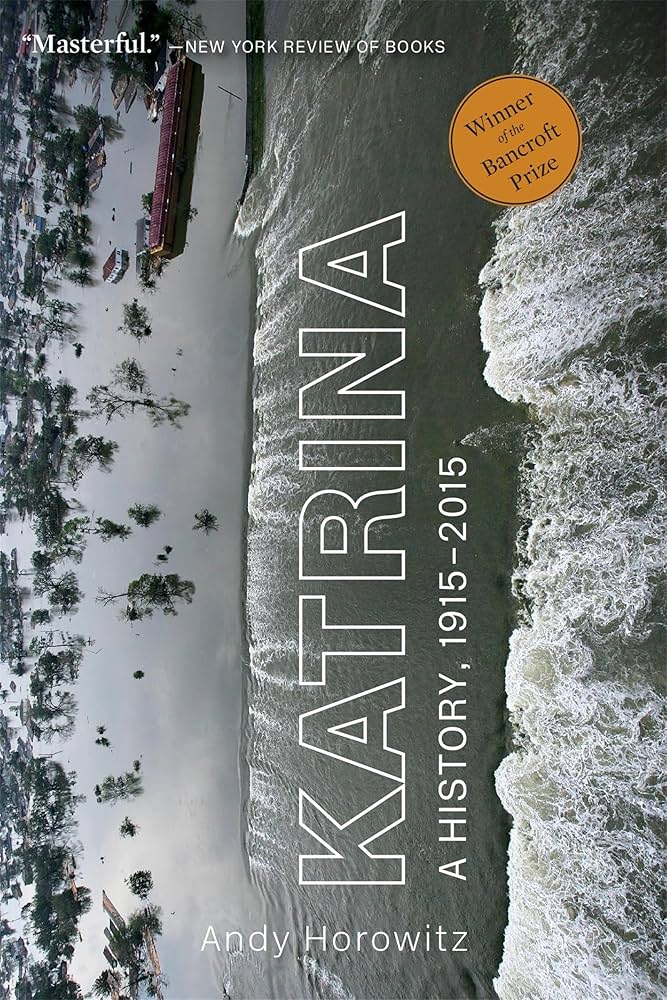
The definitive history of Katrina: an epic of city-making, revealing how engineers and oil executives, politicians and musicians, and neighbors black and white built New Orleans, then watched it sink under the weight of their competing ambitions.

As an editor of New Orleans’ daily newspaper, the Pulitzer Prize—winning Times-Picayune, Jed Horne has had a front-row seat to the unfolding drama of the city’s collapse into chaos and its continuing struggle to survive. Horne takes readers into the private worlds and inner thoughts of storm victims from all walks of life to weave a tapestry as intricate and vivid as the city itself.

Featuring the work of leading African American intellectuals, After the Storm suggests “precisely what we must do if we are to both save the planet and create the great towns and cities that we can proudly bequeath to future generations.”
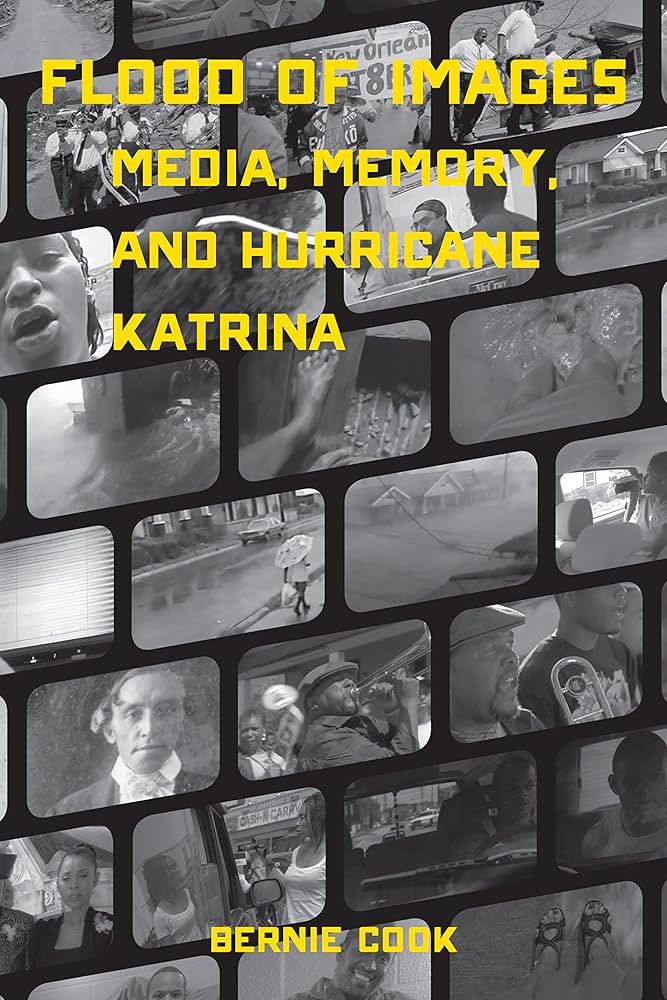
Bernie Cook offers the most in-depth, wide-ranging, and carefully argued analysis of the mediation and meanings of Katrina.
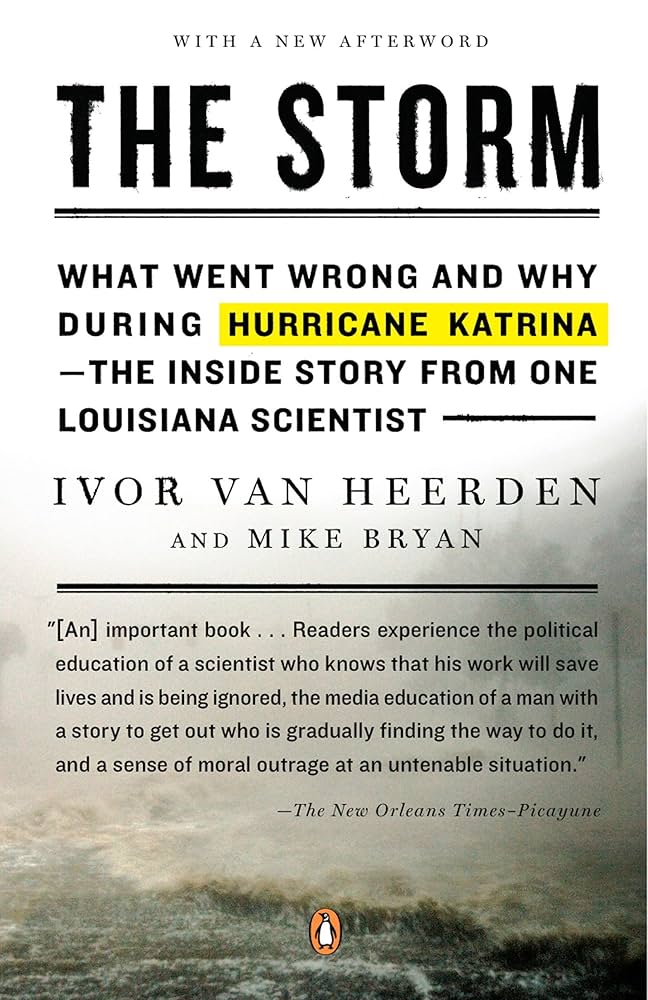
Ivor van Heerden, one of the most high-profile scientists during the Katrina disaster, lays out in full detail the stunning incompetence among bureaucrats, politicians, and the Army Corps of Engineers that culminated in the catastrophe that crippled, perhaps forever, a great American city.

The Great Deluge, finds the true heroes of this unparalleled catastrophe, and lets the survivors tell their own stories, masterly allowing them to record the nightmare that was Katrina.

Path of Destructionchronicles the environmental, technical, and political factors contributing to the devastation of New Orleans by Hurricane Katrina in 2005. It explores how decades of decisions and neglected warnings from scientists and engineers made the city vulnerable to a powerful storm, and discusses the increased threat of superstorms linked to global warming.

Come Hell or High Water analyzes Hurricane Katrina through the lens of race and class, arguing that the disaster was a "spectacle of disaster, disaster colored by race, by class, by poverty" and a result of long-term government neglect of impoverished Black communities.
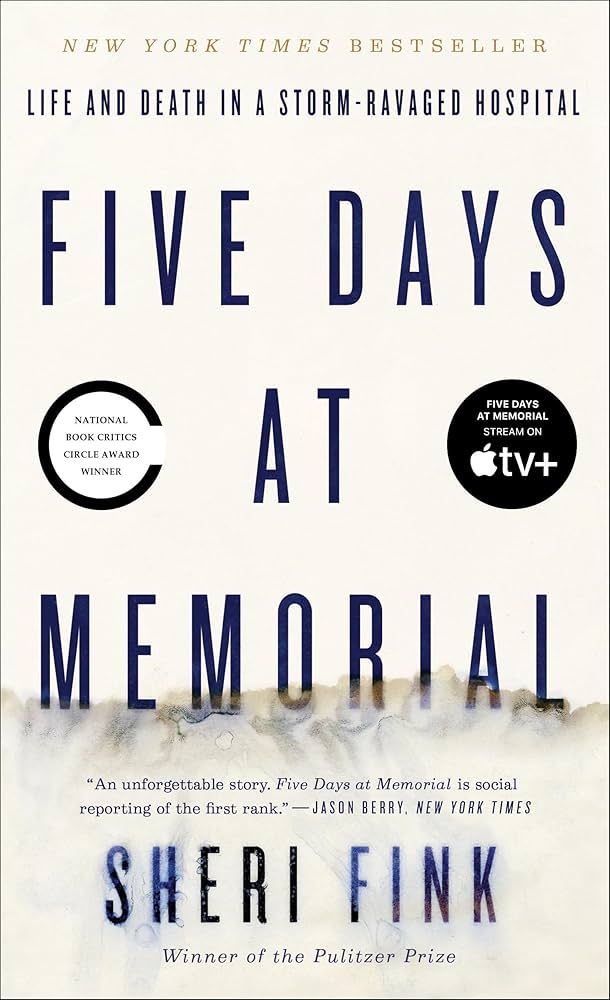
details the harrowing events at Memorial Medical Center in New Orleans during Hurricane Katrina. The book chronicles the suffering and difficult ethical decisions faced by patients and staff, who were trapped in the hospital without power or running water.
U.S. Army Corps of Engineers Investigations
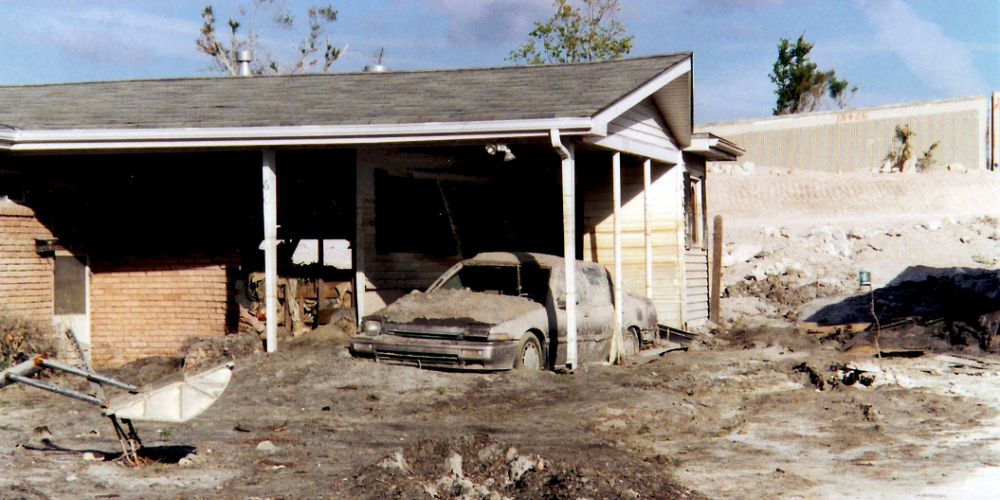 An abandoned house along Pratt Drive by the London Avenue Canal in New Orleans, near one of the levee breach sites. Photographed more than 2 months after the Hurricane Katrina.
An abandoned house along Pratt Drive by the London Avenue Canal in New Orleans, near one of the levee breach sites. Photographed more than 2 months after the Hurricane Katrina.
Source: Shutterstock
After Hurricane Katrina devastated the Gulf Coast in August 2005, the U.S. Army Corps of Engineers set out to investigate questions around the New Orleans Hurricane Protection System. These investigations helped the Corps to understand why the events related to Hurricane Katrina took place, and, in turn, how to better prepare the U.S. and its water resources infrastructure for catastrophic events.
Interagency Performance Evaluation Taskforce (IPET)
This study presents the findings of an Interagency Performance Evaluation Task Force, which evaluated the engineering failures, including breached levees, that contributed to the devastating flooding that inundated 80% of New Orleans post-Katrina.
Volumes I-IX
Volume I. Executive Summary and Overview
Volume II. Geodetic Vertical and Water Level Datums
Volume III. The Hurricane Protection System
Volume V. The Performance Levees and Floodwalls
Volume VI. The Performance Interior Drainage and Pumping
Volume VIII. Engineering and Operational Risk and Reliability Analysis
Hurricane Protection Decision Chronology
This study was designed to assemble and document the chronology of planning, economic, policy, legislative, institutional and financial decisions that influenced the hurricane protection system of Greater New Orleans.
"A General Description of Vulnerability to Flooding and Risk for New Orleans and Vicinity: Past, Present and Future" - A Supplemental Report
This report offers a non-technical explanation of the risk assessment process for the pre-Katrina, 2007, and 2011 Hurricane and Storm Damage Risk Reduction Systems.
Research Counts
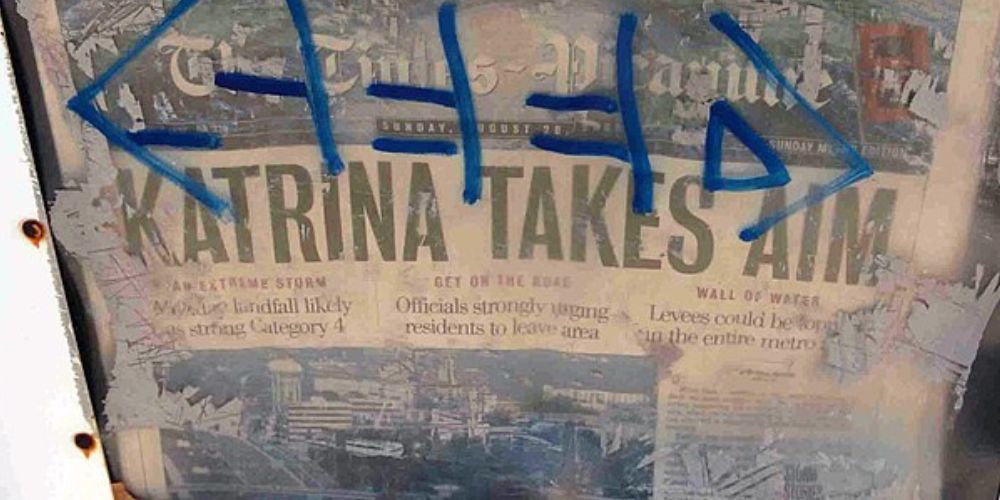 A battered newspaper box in downtown New Orleans, Louisiana (LA), contains an edition of The Times-Picayune for Sunday paper. It warns of the possible devastation Hurricane Katrina.
A battered newspaper box in downtown New Orleans, Louisiana (LA), contains an edition of The Times-Picayune for Sunday paper. It warns of the possible devastation Hurricane Katrina.
Source: U.S. Department of Defense
In the Research Counts series, researchers with a deep knowledge of Hurricane Katrina's impacts distilled key empirical findings and enduring lessons from Katrina, revisiting and recontextualizing them in the wake of similar storms like Hurricanes Harvey, Irma, and Maria.
Some Lessons From Katrina by Kai Erikson
Miss Katrina is not Finished With Me: Acknowledging the Explanatory Overreach of Recovery by Steve Kroll-Smith, Pamela Jenkins, and Vern Baxter
Supporting Children in all the Spheres of Their Lives: Lessons From Katrina by Alice Fothergill and Lori Peek
Together We Stand: The Vital Role of Social Networks Among Displaced Low-Income Women by Jacquelyn Litt
Quick Response Research

This special edited volume—funded with support from the National Science Foundation—presents findings from rapid research following the 2005 Hurricane Katrina, providing insights into emergency management, social vulnerability, and disaster response through various research approaches.
Additional Hurricane Katrina Quick Response Reports
QR201| Large Scale Rooftop Search and Rescue: The Experience of Hurricane Katrina (2008)
Matin Katirai and David M. Simpson
QR195|Enough is Enough: Social Capital in Post-Katrina New Orleans (2007)
Liesel Ashley Ritchie, Duane A. Gill
QR189|The Emergency Management Response To Hurricane Katrina: As Told by the First Responders— A Case Study of What Went Wrong and Recommendations for the Future (2006)
Henry W. Fischer, Kathryn Gregoire, John Scala, Lynn Letukas, Joseph Mellon, Scott Romine, and Danielle Turner
QR186|Reconstructing Childhood: An Exploratory Study of Children in Hurricane Katrina (2006)
Lori Peek and Alice Fothergill
QR184|Disaster Realities in the Aftermath of Hurricane Katrina: Revisiting the Looting Myth (2006)
Lauren Barsky, Joseph Trainor, and Manuel Torres
QR184|Disaster Realities in the Aftermath of Hurricane Katrina: Revisiting the Looting Myth (2006)
Lauren Barsky, Joseph Trainor, and Manuel Torres
QR180|Hurricane Katrina: GIS Response for a Major Metropolitan Area (2006)
Andrew Curtis, Jacqueline W. Mills, Jason K. Blackburn, and John C. Pine
Our Scholarship
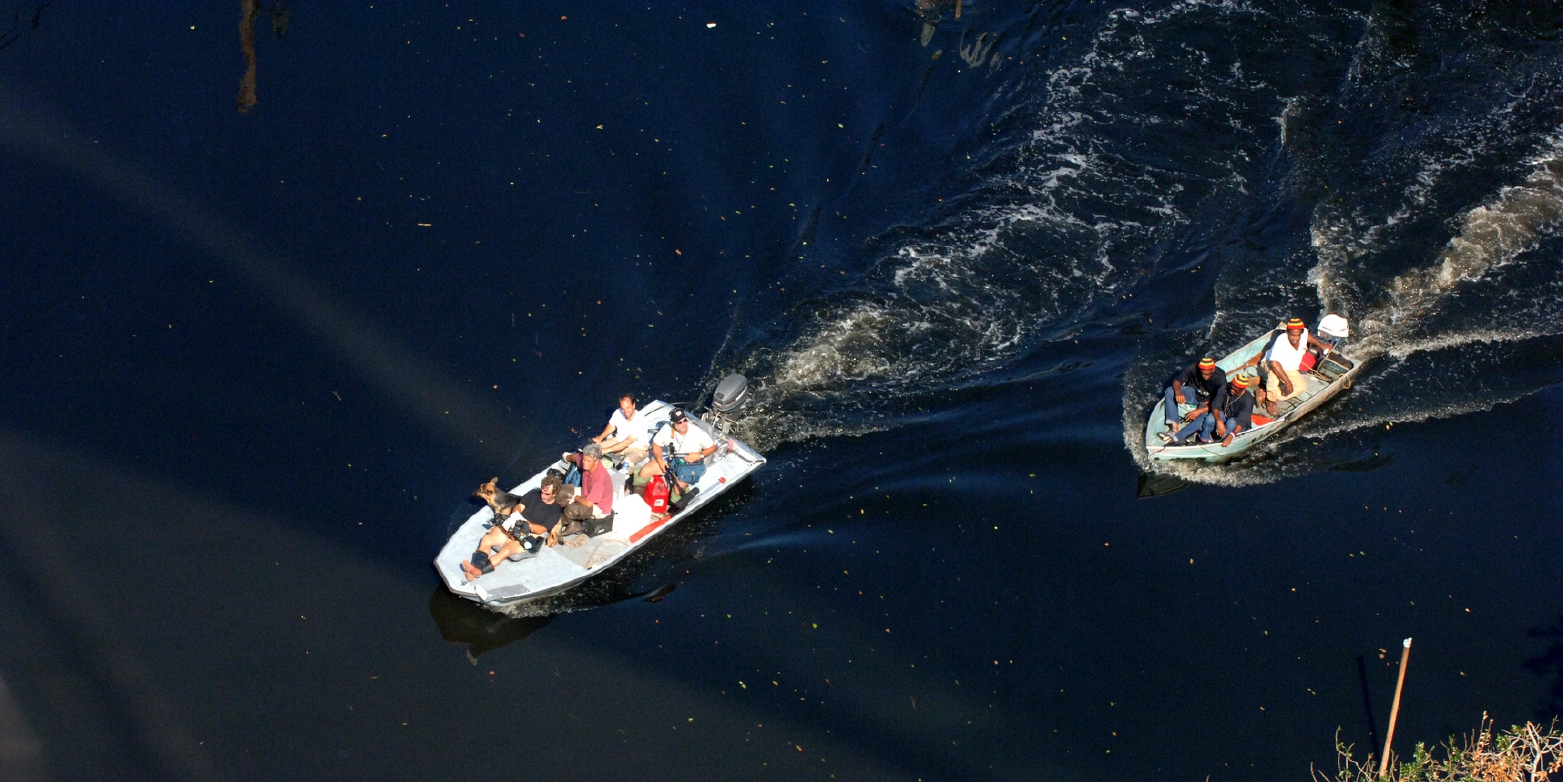 New Orleans residents travel through flooded streets by boat on September 7, 2005. Source: Jocelyn Augustino/FEMA.
New Orleans residents travel through flooded streets by boat on September 7, 2005. Source: Jocelyn Augustino/FEMA.
Hurricane Katrina spurred research across all disciplines, and even reshaped research ethics, methodological approaches, policy, and practice. Natural Hazards Center researchers have studied the storm's effect on children and families and the way Katrina shaped risk perception.
Journal Articles
Mohammad, Lubna, and Lori Peek. 2019. “Exposure Outliers: Children, Mothers, and Cumulative Disaster Exposure in Louisiana.” Journal of Family Strengths 19(1): Article 4. https://doi.org/10.58464/2168-670X.1401
Fothergill, Alice, and Lori Peek. 2017. “Kids, Creativity, and Katrina.” Contexts 16(2): 65-67. https://doi.org/10.1177/1536504217714263
Peek, Lori, and Alice Fothergill. 2014. “Post-Disaster Decline: Understanding Children’s Vulnerability Before, During, and After Katrina.” The Dialogue: A Quarterly Technical Assistance Journal on Disaster Behavioral Health 10(3): 2-4.
Additional Journal Articles
Peek, Lori, Bridget Morrissey, and Holly Marlatt. 2011. “Disaster Hits Home: A Model of Displaced Family Adjustment after Hurricane Katrina.” Journal of Family Issues 32(10): 1371-1396. https://doi.org/10.1177/0192513X11412496
Trumbo, Craig, Michelle Lueck, Holly Marlatt, and Lori Peek. 2011. “The Effect of Proximity to Hurricanes Katrina and Rita on Subsequent Hurricane Outlook and Optimistic Bias.” Risk Analysis: An International Journal 31(12): 1907-1918. https://doi.org/10.1111/j.1539-6924.2011.01633.x
Peek, Lori, and Krista Richardson. 2010. “In Their Own Words: Displaced Children’s Educational Recovery Needs after Hurricane Katrina.” Disaster Medicine and Public Health Preparedness 4(3): S63-S70. https://doi.org/10.1001/dmp.2010.10060910
Tobin-Gurley, Jennifer, Lori Peek, and Jennifer Loomis. 2010. “Displaced Single Mothers in the Aftermath of Hurricane Katrina: Resource Needs and Resource Acquisition.” International Journal of Mass Emergencies and Disasters 28(2): 170-206. https://doi.org/10.1177/028072701002800202
Zahran, Sammy, Jeffrey G. Snodgrass, Lori Peek, and Stephan Weiler. 2010. “Maternal Hurricane Exposure and Fetal Distress Risk.” Risk Analysis: An International Journal 30(10): 1590-1601. https://doi.org/10.1111/j.1539-6924.2010.01453.x
Peek, Lori, and Alice Fothergill. 2009. “Using Focus Groups: Lessons from Studying Daycare Centers, 9/11, and Hurricane Katrina.” Qualitative Research 9(1): 31-59. https://doi.org/10.1177/1468794108098029
Peek, Lori, and Alice Fothergill. 2008. “Displacement, Gender, and the Challenges of Parenting after Hurricane Katrina.” National Women’s Studies Association Journal 20(3): 69-105. https://doi.org/10.1353/ff.2008.a256897
Tierney, Kathleen. 2008. “Hurricane in New Orleans? Who Knew? Anticipating Katrina and Its Devastation.” Sociological Inquiry 78: 179-183. https://doi.org/10.1111/j.1475-682X.2008.00233.x
Tierney, Kathleen J., Christine Bevc, and Erica Kuligowski. 2006. “Metaphors Matter: Disaster Myths, Media Frames, and Their Consequences in Hurricane Katrina.” Annals of the American Academy of Political and Social Science 604(1): 57-81. https://www.jstor.org/stable/25097781
Book Chapters
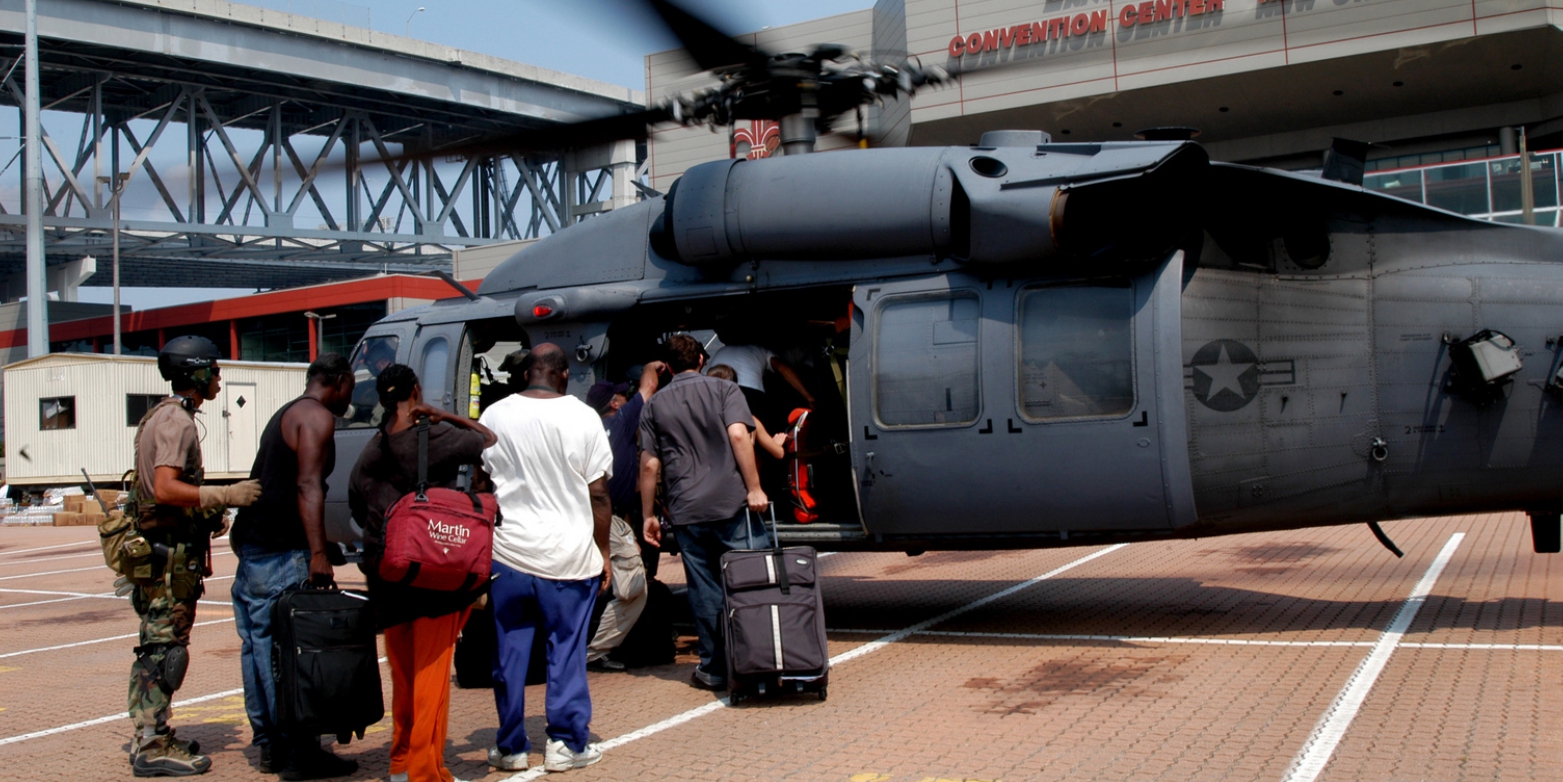 A group of evacuees at the Ernest N. Morial Convention Center being loaded onto a helicopter for transportation out of New Orleans on September 4, 2005.
A group of evacuees at the Ernest N. Morial Convention Center being loaded onto a helicopter for transportation out of New Orleans on September 4, 2005.
Source: Win Henderson/FEMA
Researchers from the Natural Hazards Center and collaborators have contributed chapters to many books exploring the sociological facets of Hurricane Katrina, including the militaristic response to the disaster, the effects of long-term displacement on survivors, and the storm's unique impacts on women, mothers, and children.
Peek, Lori, Jessica Austin, Elizabeth Bittel, Simone Domingue, and Melissa Villarreal. 2020. “Children Take Charge: Helping Behaviors and Organized Action among Young People after Hurricane Katrina.” Pp. 87-111 in Bottom-Up Responses to Crisis, edited by V. Storr and S. Haeffele. London: Palgrave Macmillan. https://doi.org/10.1007/978-3-030-39312-0_6
Fothergill, Alice, and Lori Peek. 2012. “Permanent Temporariness: Displaced Children in Louisiana.” Pp. 119-143 in Displaced: Life in the Katrina Diaspora, edited by L. Weber and L. Peek. Austin: University of Texas Press. https://doi.org/10.7560/735774-011
Peek, Lori. 2012. “They Call it ‘Katrina Fatigue’: Displaced Families and Discrimination in Colorado.” Pp. 31-46 in Displaced: Life in the Katrina Diaspora, edited by L. Weber and L. Peek. Austin: University of Texas Press. https://doi.org/10.7560/735774-006
Additional Book Chapters
Tierney, Kathleen. 2012. “Critical Disjunctures: Disaster Research, Social Inequality, Gender, and Hurricane Katrina.” Pp. 245-258 in The Women of Katrina: How Gender, Race, and Class Matter in an American Disaster, edited by E. David and E. Enarson. Nashville: Vanderbilt University Press.
Weber, Lynn, and Lori Peek. 2012. “Documenting Displacement: An Introduction.” Pp. 1-20 in Displaced: Life in the Katrina Diaspora, edited by L. Weber and L. Peek. Austin: University of Texas Press. https://doi.org/10.7560/735774-003
Tierney, Kathleen and Christine A. Bevc. 2010. “Disaster as War: Militarism and the Social Construction of Disaster in New Orleans.” Pp. 37-54 in The Sociology of Katrina: Perspectives on a Modern Catastrophe, 2nd ed., edited by D. Brunsma, D. Overfelt, and J. S. Picou. Lanham, MD: Rowman & Littlefield.
Peek, Lori, and Alice Fothergill. 2009. “Parenting in the Wake of Disaster: Mothers and Fathers Respond to Hurricane Katrina.” Pp. 112-130 in Women, Gender, and Disaster: Global Issues and Initiatives, edited by E. Enarson and D. P. G. Chakrabarti. New Delhi: Sage. https://doi.org/10.4135/9788132108078.n9
Tierney, Kathleen. 2008. “Hurricane Katrina: Catastrophic Impacts and Alarming Lessons.” Pp. 119-136 in Risking House and Home: Disasters, Cities, Public Policy, edited by J. M. Quigley and L. A. Rosenthal. Berkeley: Berkeley Public Policy Press.
Fothergill, Alice, and Lori Peek. 2006. “Surviving Catastrophe: A Study of Children in Hurricane Katrina.” Pp. 97-130 in Learning from Catastrophe: Quick Response Research in the Wake of Hurricane Katrina, edited by the Natural Hazards Center. Boulder, CO: Natural Hazards Center, Institute of Behavioral Science, University of Colorado Boulder.
Tierney, Kathleen J. 2005. “Social Inequality, Hazards, and Disasters.” Pp. 109-128 in On Risk and Disaster: Lessons from Hurricane Katrina, edited by R. J. Daniels, D. F. Kettl, and H. Kunreuther. Philadelphia: University of Pennsylvania Press.
If you have additional media or other materials to share regarding Katrina, please contact us at
